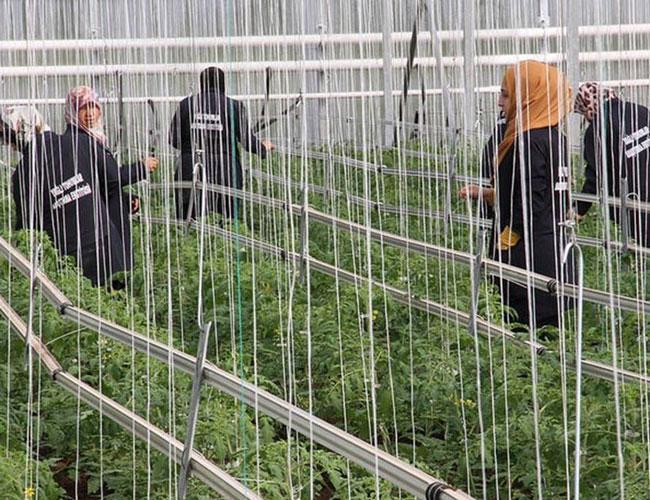
Syrian refugees living in the southern Turkish province of Osmaniye have been growing vegetables in a newly set up greenhouse next to their refugee camp, which hosts 15,000 people, as part of a project launched by the U.N. Food and Agriculture Organization (FAO).
The FAO pilot project will train 150 refugees. But the first batches of trainees have already been selected for training in greenhouse vegetable production.
An on-the-job training of refugees in greenhouse vegetable production has been held since late September. Trainees are gaining new talents they need for skilled jobs in the agriculture sector, and the vegetable yield is being distributed free of charge throughout the refugee camp to improve nutrition and food security.
Within the 8,000-square-meter greenhouse, six trainers are supervised by Çukurova University professors Yıldız Daşgan and Nafi Baytorun, who are delivering on-the-job trainings for refugees in growing eggplants, tomatoes, peppers and cucumbers.
Although seedlings were planted in late September, to date around 2.2 tons of cucumber, 180 kg of eggplant and 540 kg of pepper have been harvested and distributed. The tomatoes are turning red and are ready for the first harvest.
“FAO has never done this kind of project in Turkey before, and with such concrete results,” said Birim Mor, an FAO expert. “The majority of the trainees are women who say that this project gives them a valuable opportunity to learn new things, socialize, and boost their self-confidence.”
The greenhouse being used for this project is more environmentally friendly than most, Mor added.
“For the greenhouse heating, compressed natural gas is being used,” Mor said, “which is a much greener technology and causes less carbon footprint compared to conventional greenhouses in which coal is used as fuel.”
Sena Hamad, 36, and Rabia Ajuz, 40, are two of the trainees in the greenhouse.
“I have received vegetables from this project that we have consumed in my family and shared with our neighbors in the camp,” Hamad said. “I’m very happy with this training; it’s encouraging because I’ve learned about very different and new techniques related to greenhouse management, such as pruning of greenhouse vegetables. I used to engage with agricultural production back home, but greenhouse is so new for me. One day in the future, I hope I can manage my very own greenhouse in Syria,” Hamad told FAO, according to a published article on their website.
“I am planning to use the distributed vegetables as our own products in daily life when cooking and to prepare pickles,” Ajuz on the other hand said. “I really like the trainers here; we get on so well and they are so helpful. Not only with the greenhouse production, but we talk about so many other issues as well.”
Upon completion of their training, refugees will be awarded certifications from the Turkish Employment Agency (İŞKUR) that show their new expertise in greenhouse vegetable production, boosting their employment opportunities.